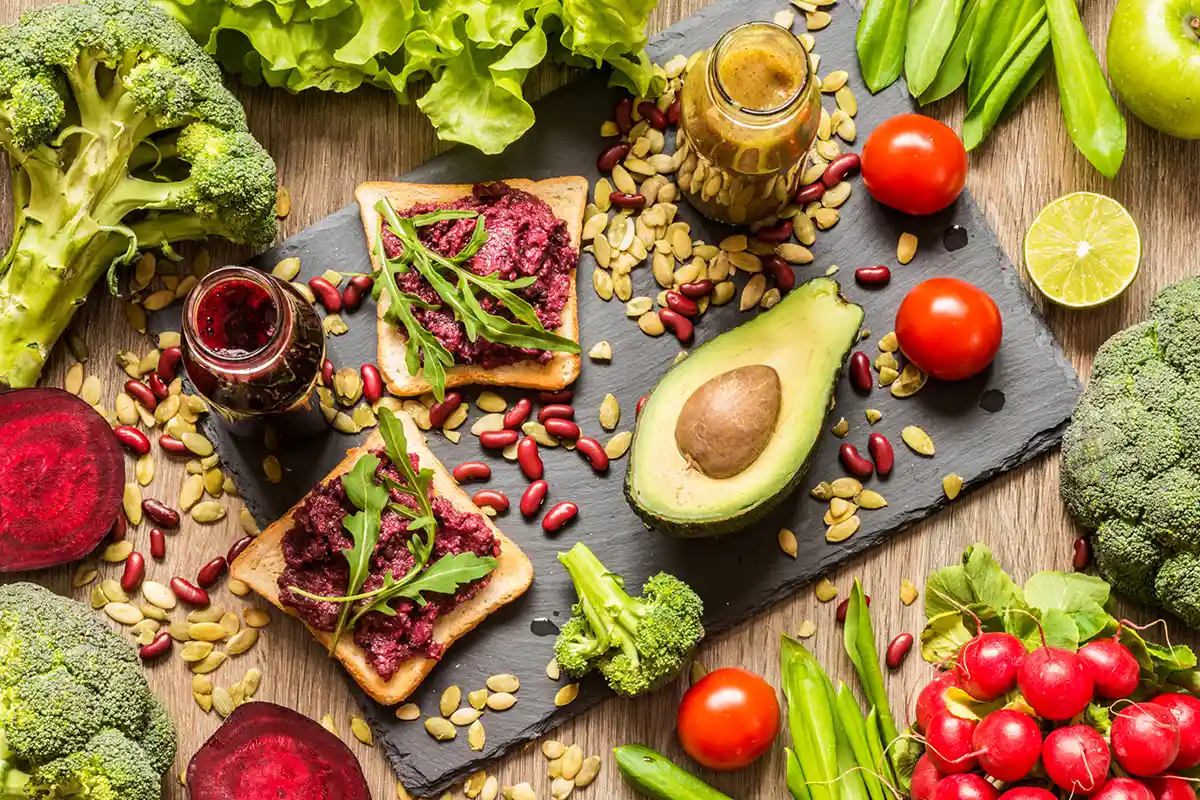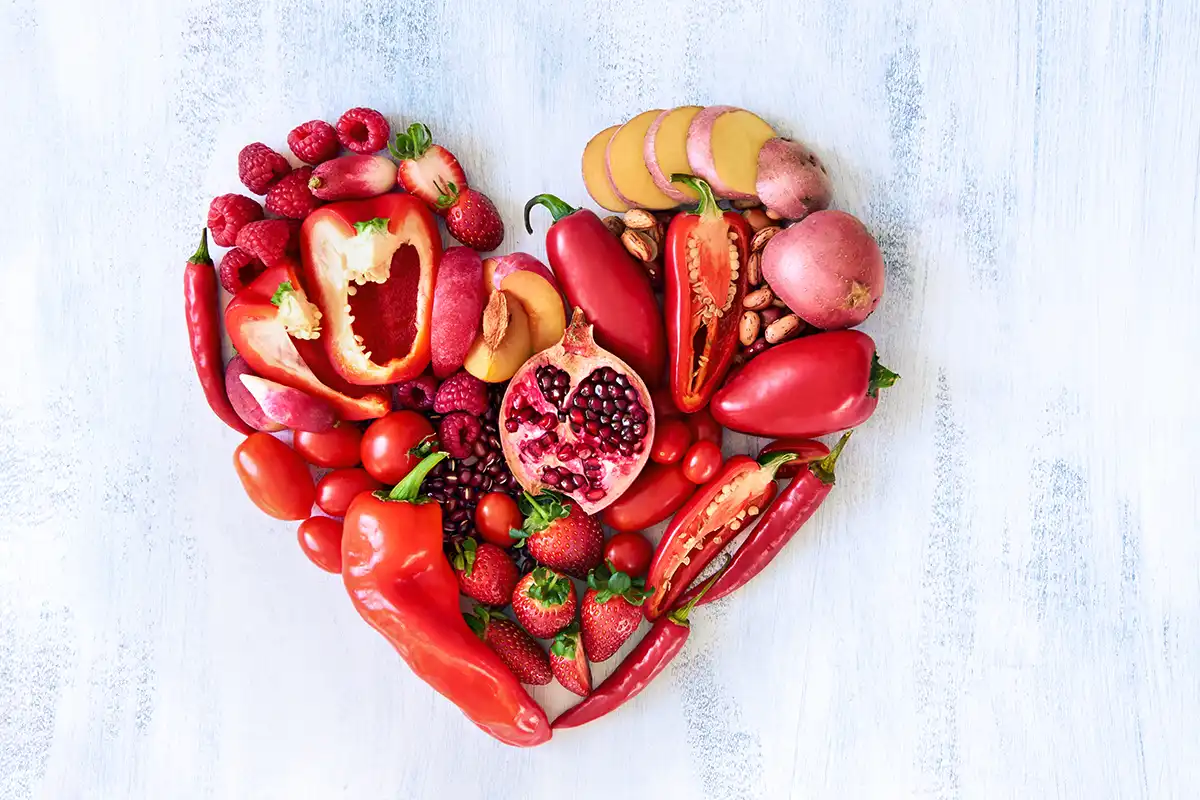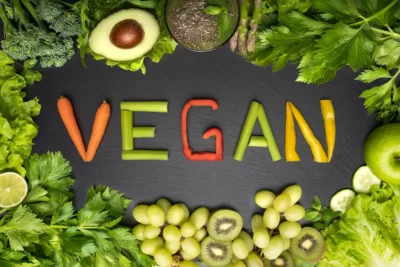With the advent of cheap genetic testing kits, it has become common to hear claims that our differing genetic profiles indicate we should all be eating diets that are tailored to us individually. Is this true and if so, what does it mean for what we eat and how healthy we can be?
Eating Meat Because of Genetics
Recently, there has been a slew of claims that some people must eat meat because their genes would not allow them to stick to a healthy, animal-free diet. In reality, the studies conducted to date have been very basic and in no way draw such conclusions. Nonetheless, these studies have grabbed the headlines and continue to dominate the conversation in some parts of social media.
“Personalized nutrition” has become something of a buzz phrase, particularly in carnivore forums and among those involved in the industrial production and promotion of meat, milk, and eggs. Take this statement from one Texan pro-meat site as an example: “The Carnivore Diet draws inspiration from these ancestral [hunter gatherer] eating patterns, positing that modern human genetics are still best adapted to a meat-centric diet.” Their article is wrong for so many reasons! For a start, our hunter-gatherer ancestors did not have a meat-centric diet! They were predominantly plant-based and were actually gatherer-hunters.
What Are Ancestral Eating Patterns?
Good question! Whenever someone cites ancestral eating patterns, we need to know what exactly they are talking about because each of us have ancestors dating back more than six million years. Are they talking about our most ancient hominin relatives, our grandparents, or some era in between? Where and when those ancestors lived, what their societal structures were like, their status, the climate, the landscape, and many other factors would have dictated what they ate but one thing is for sure… throughout those millions of years, none of them ate meat like we do today.
Are there any lessons from those early hominin diets that we can learn from? Perhaps, but due to disease and infections, food scarcity, violence, and many more dangers, our early ancestors were lucky to live to the age of 30. Comparing our health outcomes with theirs is like comparing apples and oranges.
A short life expectancy was the norm for millions of years. Only from the mid 1800s did it start to rise and although better nutrition was an important factor, so was better sanitation, more effective medicines, the advent of immunizations, and access to clean water.
One Hundred Years of Nutrition Research
Over the last 100 years, there have been countless studies on nutrition, and the consensus on what constitutes the most important advice has changed very little over that time:
- Eat sufficient calories, but not too many
- Eat whole foods, not processed foods
- Keep saturated and trans fats to a minimum
- Eat plenty of fiber-rich foods
- Drink sufficient clean water
- Meat is not essential, but if eaten, it should be limited
- Sugar should be limited
- Alcohol should be limited
- Tobacco should be avoided
So much disease and suffering could be avoided if we were able to live by this common-sense approach to our food. So, what has happened? Major corporations happened! They can’t make billions for shareholders from us eating healthily and so they process and repackage, bulk out the nutrients we need with cheap things that harm us, spend a fortune marketing this to us as food, and then sell us the notion that we can only be healthy (or happy) if we buy the products they most want to sell to us. We should reject such cynical profiteering that causes us so much harm!

Do Genetic Kits Help Us Understand Our Nutrition Needs?
Our understanding of genetics is still in its infancy. Where once we thought that a single gene would lead to a single outcome, now we know that — in most cases — it is a whole lot more complicated than that! According to Tim Spector, Professor of Genetic Epidemiology at King’s College London, how we respond to different foods cannot meaningfully be predicted from a genetic test. “In reality, there is no evidence that you can use genes to identify which foods you should and shouldn’t eat, with very few exceptions,” he says.
Twin Study and Nutrition
Our genes are only a small part of the story when it comes to nutrition. This came to light very clearly recently when Prof Spector undertook the first nutritional study of identical twins who have 100 percent of their genes in common. If there was some secret to eating dictated by our genetics, then identical twins should all be eating the same thing. But Prof Spector found cases of identical twins where both have the genes for lactose intolerance but only one has a problem eating dairy. Clearly, our genes do not tell us everything about the foods we should eat!
This study was explored more in the Netflix series You Are What You Eat: A Twin Experiment, and we can highly recommend it. This documentary examines the health of 22 pairs of identical twins, and then randomly assigns one twin a healthy plant-based diet and the other a healthy diet that includes meat, dairy, and eggs. Note: these were both intentionally balanced diets because the aim was to find out whether there were greater benefits to eating animal products or greater benefits to omitting them.
Twin Study: Is Vegan or Meat Better for You?
The study found that the participants on the healthy vegan diet had significantly lower low-density lipoprotein cholesterol levels, insulin, and body weight — all of which are associated with improved cardiovascular health — than the omnivore participants. Said Professor Christopher Gardner who led the study: “Based on these results and thinking about longevity, most of us would benefit from going to a more plant-based diet.”
So a plant-based diet is better for cardiovascular health, what about other conditions? A recent meta-analysis of all the data concluded: “Better adherence to plant-based dietary patterns, especially those emphasizing healthy plant-based foods, is beneficial for lowering the risks of major chronic conditions, including T2D [type 2 diabetes], CVD [cardiovascular disease], cancer, as well as premature deaths.” So, a healthy plant-based diet is great for overall health and longevity!

Genetic Testing for Diet
One day, we may understand the interplay between our genes and their expression well enough to be able to draw some conclusions about what foods are best suited to our optimal needs. That time is not now, and it’s not even close. But we have to ask: why are we looking for a genetic answer that may help us improve our health outcomes by one percent, when we are not listening to the wealth of research that shows us how to get the 99 percent right?
Surely, we would do better to follow the good advice that has stood the test of time and continues to guide us in the right direction instead of getting caught up in the latest fad. Let’s start with the things we can control very easily as that is where we will see the greatest results.
5 Hacks for Eating Healthily Whatever Your Genetics
1. Eat More Plants
No one has ever been advised to eat fewer vegetables, and there is a reason for this! The wealth of micronutrients they contain are essential for good health and for keeping our body processes in optimal working order. Plants also contain lots of beautiful fiber, which is essential for good gut health, and a healthy gut microbiome has a powerful impact on a wide range of health outcomes, from cancer and depression to diabetes and Alzheimer’s.
2. Choose Plant Proteins
We need protein, but protein from meat comes with a raft of problems. Processed meat, such as bacon, hot dogs, chicken nuggets, and pepperoni, are known carcinogens, while all red meat is considered a “probable carcinogen”. Getting our proteins from animals may also lead to “disorders of bone and calcium balance, increased cancer risk, disorders of the liver, and worsening of coronary artery disease,” according to Dr Michael Greger, who was featured in You Are What You Eat: A Twin Experiment. But plant proteins come packed with good stuff, so choose beans, nuts, tofu, seitan, seeds, peas, and lentils, and remember that all plant foods contain some protein, so eat a wide range, and you’ll find it hard to go short.
3. Avoid Ultra-Processed Foods
So much of the food we eat is processed, and that is not necessarily a bad thing. Our lives and diets are much better because we can reach into the cupboard and bring out a loaf of bread, a pack of pasta, or a can of tomatoes and make a meal from it. But ultra-processing is a problem. Ultra-processed foods include sodas, candies, fried snacks, cakes, and biscuits, and they contain ingredients you would not find in a typical kitchen. Eating ultra-processed foods harm our health and Harvard research shows they are associated with a slightly higher risk of mortality.
4. Ditch All Processed Meat for Plant-Based Versions
The same Harvard study found that the risk of mortality was particularly high for those who eat processed meats, and that includes both chicken and fish-based products. Eating these foods shortens our lives, and we would do well to avoid them entirely. However, we need not lose the pleasure we get from eating these kinds of products. Eating processed plant-based foods that mimic chicken, meat, and fish products does not appear to have the same risks.
5. Eat Whole Foods
When we buy ingredients rather than pre-packaged convenience foods, wonderful things happen. We get many more of the nutrients from the products without the harmful additives used in processing. We can control what we put into our bodies, and we can experiment with the wealth of flavors, tastes, and textures that the Earth affords us. It can take a little time for our taste buds to adapt away from the high-fat, high-sugar, highly-processed foods that the world’s major corporations have helped get us hooked on, but it really doesn’t take that long. Soon, those processed foods will taste as fake as they are, and your body will respond to this new way of eating positively and with joy.

Barriers to Eating a Whole Food Plant-Based Diet
We acknowledge that eating a whole food plant-based diet can be challenging for lots of people. Unless we can grow our own produce, we are only able to choose from the foods that are available around us. Sadly, there are plenty of places where processed unhealthy foods proliferate while fresh produce cannot be found.
We also acknowledge that not everyone has the time or has been given the skills to create healthy meals from base ingredients.
And finally, we know there are cultures for whom animal products play an important role, although some foods — such as dairy in India, for example — have been marketed that way, and are not, in fact, the traditional foods that people may believe they are.
Despite this, for most of us, there is much we can do to move towards this healthy way of eating. One great place to start is with these 10 tasty recipes that are quick to make and require no complicated skills.
10 Easy and Affordable Recipes for Healthy Eating
There are millions of delicious plant-based recipes available freely online, but these main meals are all from the makers of Forks Over Knives … another film you should see if you are interested in health and nutrition!
- Tex Mex Pita Pizzas
- Best-Ever Beefless Stew
- Quick and Easy Noodle Soup
- Burritos with Spanish Rice and Black Beans
- Italian Style Zucchini and Chickpea Sauté
- Black Bean Burgers
- Potato and Cauliflower Curry
- Moroccan Bean Salad
- Tofu-Fried Rice
- Slow-Cooker Vegan Cassoulet
Conclusion
Genetic tests tell us nothing about what we should eat, and they may never give us any truly meaningful guidance. But that’s OK because we already know the foods and dietary choices that will give us the best chance at optimal health. We don’t need to spend money on a test to be told what we should be eating, because when we eat a whole food plant-based diet, we are getting all the nutrients we need without the damaging animal products or the ultra-processed ingredients that cause so much harm to our health.



